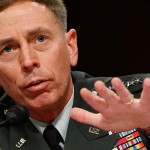Petraeus Pushes Back on Afghan Deadline
 Afghanistan is a long hard slog that the U.S. can and must win. General Petraeus knows this, but does the president?
Afghanistan is a long hard slog that the U.S. can and must win. General Petraeus knows this, but does the president?
David Gregory's interview with General Petraeus on NBC’s Meet the Press this morning is well worth watching. The General cogently addressed all of the key issues and concerns about Afghanistan, including the bottom-line question: Is it worth it, and can we win?
Petraeus’ answer in short: Yes it is, and yes we can. However, success will take time; success will not be gauged or demonstrated by traditional measures of military progress; and Afghanistan will not be transformed into a Western-style industrial democracy.
But Afghanistan can be stabilized; it can cease to be a staging ground for terrorists and terrorist networks; and it can become a more or less peaceful country, with a more representative and democratic government.
This is reassuring to hear, especially at a time when, according to a recent NBC News-Wall Street Journal poll, nearly seven out of ten Americans don’t believe the war in Afghanistan will end successfully. Petraeus disagrees. The keys to success, he believes, are time, patience and a comprehensive counterinsurgency strategy.
A counterinsurgency strategy is necessary, Petraeus explained, because in order to win in Afghanistan, the government there must gain the confidence of the Afghan people.
This is no easy task in a country that has been at war for 30 years, and which fears U.S. troops may leave prematurely. And although Petraeus didn't say so of course, President Obama’s announced July 2011 timeline for withdrawal has seriously undermined the U.S. war effort there.
Afghans rightly see this timeline as an indication that, sooner or later, America will abandon them to the Taliban. This naturally makes them reluctant to turn on the Taliban and to work with U.S. forces. That’s why Petraeus again emphasized that July 2011 is simply the date when
a process begins, that is conditions-based. And, as the conditions permit, we [will] transition tasks to our Afghan counterparts and the security forces and in various governmental institutions; and that enables a "responsible drawdown of our forces…”
Moreover, Petraeus added:
I think that we will have an enduring commitment here in some fashion, the character of which may change over time as our Afghan partners can do more, and we’re able to do less in certain areas. Certainly.
Indeed, creating and sustaining the perception amongst Afghans that America is committed to them and their country for the long-term and will not abandon them is an absolute prerequisite to success. Because as Petraeus observed, many Afghans are “professional chameleons… They end up siding with whichever side it appears is going to prevail.” That’s how they survive in this dangerous and complex, war-torn country.
Thus, America’s “first and most important task,” said Petraeus, “has to be to improve the security for the people” so that they can participate in Afghanistan’s fledgling and indigenous civic and political institutions.
Petraeus’ counterinsurgency strategy worked in Iraq; and there is every reason to think that it can work in Afghanistan. But it will take time -- and probably more time than the politicians would like.
In his interview with Meet the Press, Petraeus mentioned three to five years. At another point in the interview, he mentioned five to 10 years. The three-to-five-year period, Petraeus suggested, seems to be required to stabilize Afghanistan. The five-to-ten-year period seems to be required to achieve more lofty, and perhaps unrealistic objectives, which Obama already has discounted.
Either way, Afghanistan is a long hard slog that the United States can and must win. Gen. Petraeus knows this, but does the president and do our politicians?
You can follow John Guardiano on Twitter: @JohnRGuardiano